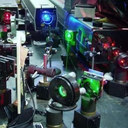25C3 - 1.4.2.3
25th Chaos Communication Congress
Nothing to hide
| Speakers | |
|---|---|
|
|
Claus "HoloClaus" Cohnen |
| Schedule | |
|---|---|
| Day | Day 2 (2008-12-28) |
| Room | Saal 2 |
| Start time | 23:00 |
| Duration | 01:00 |
| Info | |
| ID | 3016 |
| Event type | lecture |
| Track | Science |
| Language used for presentation | en |
| Feedback | |
|---|---|
|
Did you attend this event? Give Feedback |
Life is a Holodeck!
An overview of holographic techniques

This talk will give you an overview of the different techniques for spacial representation and show you how they work. Starting with a brief history on the invention of stereoscopy and lenticular representation we will quickly get into history and invention of holography, the basic principles and milestones during development through to the latest available applications and technologies. Different types of Holograms will be shown and explained.
Topics:
- Dennis Gabor - Leith/Upatnieks Invention and the first Hologram "Train and Bird"
- Holographic Mastering Techniques:
- H1 (classical 2 beam transmission Hologram on a mastering-table)
- Whitelight copies of such H1´s - Lippmann / Denisyuk / Reflection Holograms
- Rainbow/Benton Hologram:
- Photoresist mastering and electroforming to produce printing plates (shims) for embossed Holograms
- Dot-Matrix Origination - Computer generated Pixel Holograms usually on foil
- True-Color Reflection / Transmission Hologram Mastering
- Video-, Animation and fully computer generated 3D Holograms
Holographic Techniques, Processing, Converting and Special Machinery:
- Microtext + Nanopoints
- "Hidden" information and "hidden" Holograms
- Recombining Systems
- Electron Beam Mastering
- Electroforming Tanks
- Soft- and Hard Embossing Machines: Principle and different types and sizes of conventional holographic embossing machines
- New and future generation manufacturing technology and equipment - Principles of UV/Electron Beam Casting
- Converting Equipment
An overview on market segments as well as current science applications such as HOE´s, (Holographic Optical Elements), holographic interferometry, 3D-projection systems, fully computer generated holograms, optical computing using holographic techniques and other aspects will be given, while at the end we´ll hopefully see what can be done to build your own Holodeck :-)
